- Home
- Deborah Harkness
Time's Convert Page 28
Time's Convert Read online
Page 28
The place was in much better condition than it had been on the day Marcus killed his father.
A woman laughed. It wasn’t his mother’s laughter—he would have known that silvery, infrequent sound in a heartbeat. He stopped his horse to see who lived here now, and de Clermont stopped with him.
A young woman of twenty or so came from the henhouse. She was blond, sturdy looking and strong, with a red-and-white apron over a blue dress that was simple but clean. She had a basket of eggs in one arm, and a pail of milk slung over the other.
“Ma!” the woman called out. “The hens laid! There are enough eggs to make custard for Oliver!”
It was his sister. This young woman—she was his sister.
“Patience.” Marcus kicked his horse and started forward.
“It’s your decision whether or not you speak to your family,” de Clermont said. “But remember: You can’t tell them what you’ve become. They wouldn’t understand. And you can’t remain here, Marcus. Hadley is too small to harbor a wearh. People will know you’re different.”
Then his mother came from the back door of the house. She was older, her hair white, and even at a distance Marcus could see the wrinkles that were etched into her skin. Still, she didn’t look as tired as the last time he had seen her. In her arms was a baby wrapped in a homespun blanket. Patience kissed it on the forehead, talking to it with the rapt adoration that new mothers lavished on their children.
My nephew, Marcus realized. Oliver.
Catherine, Patience, and Oliver formed a small family knot around the door. They were happy. Healthy. Laughing. Marcus remembered when fear and pain hung over the house in a dark pall. Somehow, joy had returned when Obadiah and Marcus departed.
Marcus’s heart stopped in a spasm of grief for what might have been. Then it started up again.
This was no longer his family. Marcus did not belong in Hadley anymore.
But he had made it possible for his mother and sister to find a new life for themselves. Marcus hoped that Patience’s man—if she still had one and he had not been killed in the war—was good and kind.
Marcus turned his horse’s head away from the farm.
“Who is that?” Patience’s question floated through the air. Had he not been a wearh, Marcus might not have been able to hear her.
“It looks like—” his mother began. She stopped, seeming to consider whether her eyes were playing tricks.
Marcus faced resolutely forward, eyes on the horizon.
“No. I was mistaken,” Catherine said, her voice tinged with sadness.
“He’s not coming home, Ma,” Patience said. “Not ever.”
Catherine’s sigh was the last thing Marcus heard before he put all that he once was and might have been behind him.
22
Infant
NOVEMBER 1781
Portsmouth’s harbor was filled with ships waiting to load and unload their cargo. Though it was well past midnight, the docks still bustled with activity.
“See if you can find a ship called the Aréthuse,” de Clermont told Marcus, passing him the horse’s reins. “I’ll ask at the tavern to see if anyone’s spotted her.”
“How big?” Marcus studied the sloops, schooners, brigantines, and whaleboats.
“Big enough to make it across the Atlantic.” De Clermont pointed to a ship at the very edge of the harbor. “There. That’s her.”
Marcus squinted into the dark, trying to make out the name. But it was the French flag flying off the stern that convinced him de Clermont was right.
De Clermont jumped into a small skiff and pulled Marcus in after him. The sailor on watch was horribly drunk and barely noticed that the vessel in his charge had been taken. De Clermont made quick work of reaching the Aréthuse, pulling mightily on the oars so that the boat’s pointed bow rose up with every stroke.
When they reached the ship, someone flung a rope ladder over the side.
“Climb,” de Clermont commanded, holding the skiff steady against the hull.
Marcus eyed the ship’s steep side with concern.
“I’ll fall off into the sea!” he protested.
“It’s a long way, and the water is cold. You’re better off taking your chances on the ladder.” A disembodied voice floated down to them. Then, a square-jawed, clean-shaven face appeared over the railing, wreathed in shoulder-length golden hair that had escaped from the cocked hat perched, backward, on his head. “Hello, Uncle.”
“Gallowglass.” De Clermont touched his hat in greeting.
“And who’s this with you?” Gallowglass asked, squinting at Marcus with suspicion.
“Let’s get him up there before you start questioning him.” De Clermont took Marcus by the scruff of the neck and lifted him up the first two rungs of the rope ladder while the skiff rocked underneath them.
When he reached the top, Marcus fell onto the deck in a dizzy heap. He was not, it turned out, very good with heights anymore. He closed his eyes to let the sea and sky return to their proper positions. When he opened them, there was a giant wearh hovering over him.
“Jesus!” Marcus scrambled away, afraid for his life. He might be hard to kill now, but he was no match for this creature.
“Christ and his apostles. Don’t be daft, boy,” Gallowglass said with a snort. “I’m hardly going to attack my own cousin.”
“Cousin?” The family connection did nothing to soothe Marcus’s fears. In his experience, family members often posed the greatest danger.
An arm the size of a howitzer shot forward, palm open, bent at the elbow. Marcus remembered how John Russell and de Clermont had said their greetings and taken their farewells. Wearhs must all be Masons, he thought—or perhaps this was a French custom?
Marcus gingerly clasped the proffered arm, elbow to elbow, aware that his cousin could break it like a twig. Anxious at the prospect of further injury, Marcus’s fingers tightened on Gallowglass’s muscular arm.
“Easy there, pup.” Gallowglass’s eyes creased in warning as he lifted Marcus to his feet.
“Sorry. Don’t seem to know my own strength these days,” Marcus mumbled, embarrassed by his inexperience.
“Hmph.” Gallowglass’s mouth tightened as he released his grip.
De Clermont swung himself from the ladder to the deck with the lithe self-assurance of a tiger. The man he called Gallowglass turned and, in a blur of fists, landed two blows to de Clermont’s jaw.
Cousin or no cousin, Marcus’s protective instincts howled to life and he launched himself at the stranger. Gallowglass’s paw held him off with lazy ease.
“You’ll be wanting to ripen a bit more before you take me on,” Gallowglass advised Marcus.
“Stand down, Marcus,” de Clermont said once he had realigned his jaw and worked it open and closed a few times.
“What the hell were you thinking, Uncle, making a baby in the middle of a war?” Gallowglass demanded of de Clermont.
“The circumstances of your own rebirth were not so different, as I recall.” De Clermont’s aristocratic black eyebrows shot heavenward.
“Hugh sired me after the heat of battle was over, when he was picking through the field looking for dead friends,” Gallowglass said. “This boy is too young to have seen battle. You found him loafing about on some corner, I warrant, and took the stray in.”
“The boy has seen more than you know,” Matthew said in a tone that discouraged further conversation on this point. “Besides, the war is all but over. Both armies are riddled with fever and tired of fighting.”
“And Gil? You didn’t just leave him there?” Gallowglass swore a blistering oath. “You had two jobs, Matthew: see to it the colonials won the war, and return the Marquis de Lafayette to France in one piece.”
“Pierre is with him. Baldwin is among the jaegers. And John Russell has a place in Cornwalli
s’s staff and the terms of surrender in his pocket. I’ve done my job.” Matthew straightened the seams on his gloves. “The morning is upon us. To business, Gallowglass.”
Gallowglass led them to a small cabin belowdecks that had a view of the water through a wide rectangular window. The room was sparsely furnished with a desk, a few stools, a heavy-bottomed chest, and a hammock strung up between two posts.
“Your letters.” Gallowglass opened the chest and drew out a small oilskin pouch. He tossed it to de Clermont.
De Clermont loosened the ties and riffled through the contents. He drew out a few pieces and hid them away in the breast pocket of his coat.
“You missed one.” Gallowglass plucked out another that was sealed with a heavy daub of red wax. “Mademoiselle Juliette sends her regards. And here is Granddad’s post.”
The second bag Gallowglass pulled from the chest was considerably larger than the first and full of interesting bumps and bulges, one of which looked like a bottle of wine.
“Madeira. For General Washington,” Gallowglass said, tracking Marcus’s wandering attention. “Granddad thought he might share it with Mrs. Washington after he’s back home.”
Marcus knew that the Marquis de Lafayette was dear to General Washington, but had no idea there was a connection between the chevalier de Clermont and the commander of the Continental army.
“How kind,” Marcus said, filing this bit of intelligence away for further reflection.
“Oh, I doubt it,” Gallowglass said cheerfully. “Philippe will want something in exchange. He always does.”
“And how is Philippe?” de Clermont asked. “And my mother?”
“Davy says they’re finer than frog’s hair,” Gallowglass replied.
“That’s it?” de Clermont said. “That’s all the news from France?”
“I haven’t got time for a saucer of tea and a lengthy reunion, Matthew. I want to catch the tide.” Gallowglass sniffed the wind like a hound.
“You’re hopeless.” De Clermont sighed and handed over a small stack of letters and a silk bag. “These are for Juliette. Don’t lose the strand of beads.”
“When have I ever lost anything?” Gallowglass’s blue eyes widened in indignation. “I’ve been to the edges of the earth running errands for this family and even got that bloody leopard from Constantinople to Venice so that Granddad didn’t leave the sultan’s gift behind.”
Marcus liked this brawny Scot. Gallowglass made Marcus wonder what his own Scots grandfather might have been like as a young man.
“True. These are for Philippe. General Washington’s letters are on top. See he reads those first.” De Clermont handed him another parcel of mail. He pointed to Marcus. “And of course, there’s him.”
Gallowglass was dumbfounded. So, too, was Marcus.
“Oh no. No. Absolutely not.” Gallowglass held his hands up in horror.
“Me?” Marcus’s head swung from Matthew to Gallowglass and back again. “I can’t go to France. I’m staying with you.”
“I have to get back to Yorktown to oversee the peace, and you’re not ready for that much society,” de Clermont said.
“What about my ship? Life at sea is hardly suitable for a newly made wearh!” Gallowglass exclaimed. “He’ll eat the crew before we reach France.”
“I’m sure one of them will feed him, for the right price,” de Clermont replied, unconcerned.
“But there’s nowhere to hunt at sea. Have you lost your mind, Uncle?”
Marcus wondered the same thing.
“Can he even feed himself?” Gallowglass demanded. “Or must he be bottle-fed like a mewling infant?”
“I fed on a man—in Albany!” Marcus replied, indignant.
“Ooh. Albany. Very nice. Had a bit of farmer and a nibble of fur trapper?” Gallowglass snorted. “You’ll get naught but stale beer and rat with me. It’s not enough to keep a baby alive.”
“Baby?” Marcus’s arms windmilled toward Gallowglass in a gratifying whirl of speed. Sadly, they never made contact with their target. De Clermont took him by the collar and flung him into the corner.
“No more arguments—from either of you,” de Clermont said brusquely. “You’re taking him to France, Gallowglass. See to it he gets there alive. I promised him an education.”
“We’ll need more chickens,” Gallowglass remarked. “And what do I do with him once we reach Bordeaux?”
“Deliver him to Maman,” de Clermont said, making his way to the door. “She’ll know what to do. À bientôt, Marcus. Obey Gallowglass. I’m putting you in his charge.”
“Wait just a minute!” Gallowglass strode after de Clermont.
Marcus watched from the quarterdeck as the two men had a heated argument. When Gallowglass sputtered into silence, de Clermont swung over the rail and disappeared down the rope ladder.
Gallowglass watched him descend. He shook his head, then turned to face Marcus and sighed. Then the giant wearh cupped his hands around his mouth and let out a deafening whistle.
“Cast off, lads!”
* * *
—
MARCUS WATCHED THE VANISHING SPECK of shoreline from the quarterdeck and wondered whether it might be wise to swim back to shore after all. The big sailor crouched down next to him.
“We still haven’t been properly introduced.” One arm shot toward Marcus. “I’m Eric. Most people just call me Gallowglass.”
“Marcus MacNeil.” He took Gallowglass’s arm again. This time the gesture felt right, familiar. “Most people call me Doc.”
“Marcus, eh? A Roman name. Granddad will be pleased.” Gallowglass’s eyes were permanently creased at the corners, which made him look as though he were about to burst into laughter.
“The chevalier de Clermont didn’t tell me he had a father,” Marcus said, daring to reveal his ignorance.
“The chevalier de Clermont?” Gallowglass tipped his head back and roared with laughter. “Christ’s bones, boy. He’s your maker! I understand your reluctance to call him Papa—Matthew is as paternal as a porcupine in full needle—but you might at least call him by his first name.”
Marcus considered it but found it impossible to view the austere, mysterious Frenchman as anything but the chevalier de Clermont.
“Give it time,” Gallowglass said, patting Marcus on the shoulder. “We’ve got weeks to share stories about your dear dad. By the time we arrive in France, you’ll have far more colorful names for him than Matthew. More fitting, too.”
Perhaps the journey would not be as tedious as Marcus had feared. He felt the slender, familiar outlines of Common Sense in his coat pocket. Between Thomas Paine and Gallowglass, Marcus could spend the entire voyage reading and figuring out what it was going to take to survive as a vampire.
“I saw—felt—some of the chevalier’s history.” Marcus wasn’t sure whether this was something he should discuss.
“Bloodlore is tricky. It’s no replacement for a proper story.” Gallowglass ran a gloved finger under his nose, which had gone watery in the rising wind.
This was another unfamiliar word—like “wearh” and “maker.” Marcus’s curiosity must have shown.
“Bloodlore is the knowledge that’s in the bones and blood of every creature. It’s one of the things we crave as wearhs,” Gallowglass explained.
Marcus had felt that hunger to know—along with the urge to hunt, to drink blood, and to fight. It was comforting to realize that his lively curiosity—a curse, his father Obadiah had called it—was now a normal, acceptable part of who he was.
“Didn’t Matthew explain how the world really works and what you were about to become before he made you?” Gallowglass looked concerned.
“He might have. I’m not sure,” Marcus confessed. “I had a fever—a bad one. I don’t remember much. The chevalier told me I would be able to go to university, a
nd study medicine.”
Gallowglass swore.
“I have some questions,” Marcus said hesitantly.
“I imagine you do, lad,” Gallowglass said. “Fire away.”
“What’s a wearh?” Marcus asked, his voice low in case a member of the ship’s crew was nearby.
Gallowglass buried his face in his hands and groaned.
“Let’s start at the beginning,” he said, rising to his feet with the practiced grace of a man who had spent his life afloat. Gallowglass extended a hand to Marcus and lifted him up. “You’ve a long journey ahead of you, young Marcus. By the time we get to France, you’ll understand what a wearh is—and what you’ve taken on by becoming one.”
* * *
—
ONCE THEY WERE ON OPEN seas, Gallowglass had all the flags lowered save one that was black with a silver snake carrying its tail in its mouth. This kept most vessels at a respectful distance.
“The family crest,” Gallowglass explained, pointing up at the standard that flapped and crackled in the wind. “Granddad is more gruesome than any pirate. Not even Blackbeard wanted to be on his bad side.”
During the voyage, Gallowglass told Marcus a story about what it was to be a wearh that finally made sense of the weeks since Yorktown. At last Marcus understood the nature of not only wearhs, but witches, daemons, and humans, too. He was fairly sure, looking back over his life, that the healer at Bunker Hill had been a witch. And he knew for certain that John Russell—the man he first knew as Cole—was a wearh. As for daemons, Marcus didn’t think he knew any, although Vanderslice was the most likely prospect.
Gallowglass also impressed upon him what it was to be a de Clermont. Oddly, it seemed that becoming a blood-drinking, nearly immortal, volatile, two-legged creature was the easier task. Being a de Clermont seemed to require knowledge of a great many prickly characters and mastery of a list of rules a mile long. Based on Gallowglass’s description of the family and how it operated, it did not seem that the de Clermonts had read Common Sense. There was certainly no hint that they had embraced the new world of liberty and freedom that Paine outlined in his work. While Marcus lay in his berth, reading and rereading the worn pages of his treasured book, he had time to wonder what his new family would think of Paine’s assertion that virtue was not hereditary.

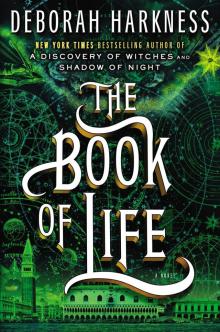 The Book of Life
The Book of Life Shadow of Night
Shadow of Night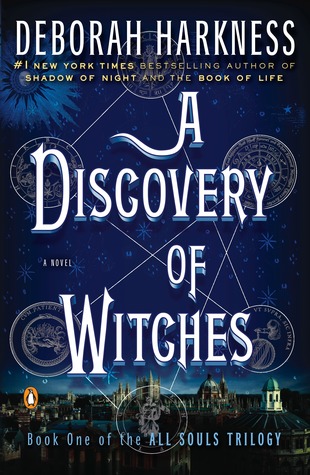 A Discovery of Witches
A Discovery of Witches The All Souls Real-Time Reading Companion
The All Souls Real-Time Reading Companion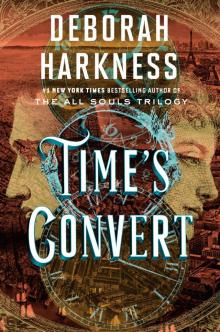 Time's Convert
Time's Convert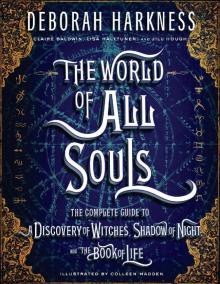 The World of All Souls
The World of All Souls A Discovery of Witches: A Novel (All Souls Trilogy)
A Discovery of Witches: A Novel (All Souls Trilogy)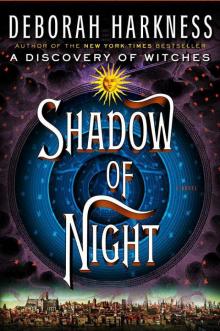 Shadow of Night: A Novel
Shadow of Night: A Novel